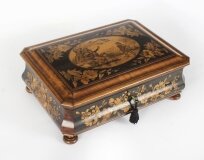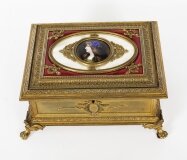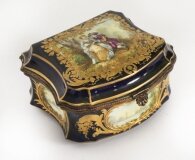Savinelli Humidors
Founded in 1876, Savinelli is a well-respected Italian brand in the cigar world, known for producing high-quality smoking accessories and humidors. Their humidors are crafted from premium materials, such as Spanish cedar, and are designed to keep cigars at optimal humidity levels, preserving their flavor and aroma. Savinelli's humidors are not only functional but also stylish, featuring elegant finishes and classic design elements. The brand has a reputation for excellence and is trusted by cigar enthusiasts around the world. If you are looking for a humidor that is both practical and attractive, Savinelli is a great choice. Whether you have a large collection or just a few special cigars, a Savinelli humidor is a must-have item for any smoker looking to keep their cigars in top condition.
Harrods founder Charles Henry Harrod first established his business in 1824, aged 25. The business was located south of the River Thames in Southwark. The premises were located at 228 Borough High Street.
He ran this business, variously listed as a draper, mercer and a haberdasher, certainly until 1831. During 1825 the business was listed as 'Harrod and Wicking, Linen Drapers, Retail', but this partnership was dissolved at the end of that year. His first grocery business appears to be as ‘Harrod & Co.Grocers’ at 163 Upper Whitecross Street, Clerkenwell, E.C.1., in 1832. In 1834 in London's East End, he established a wholesale grocery in Stepney, at 4, Cable Street, with a special interest in tea.
In 1849, to escape the vice of the inner city and to capitalise on trade to the Great Exhibition of 1851 in nearby Hyde Park, Harrod took over a small shop in the district of Brompton, on the site of the current store. Beginning in a single room employing two assistants and a messenger boy, Harrod's son Charles Digby Harrod built the business into a thriving retail operation selling medicines, perfumes, stationery, fruit and vegetables. Harrods rapidly expanded, acquired the adjoining buildings, and employed one hundred people by 1880.
However, the store's booming fortunes were reversed in early December 1883, when it burnt to the ground. Remarkably, in view of this calamity, Charles Harrod fulfilled all of his commitments to his customers to make Christmas deliveries that year—and made a record profit in the process. In short order, a new building was built on the same site, and soon Harrods extended credit for the first time to its best customers, among them Oscar Wilde,Lillie Langtry, Ellen Terry, Charlie Chaplin, Noël Coward, Gertrude Lawrence, Laurence Olivier and Vivien Leigh, Sigmund Freud, A. A. Milne, and many members of the British Royal Family.
On Wednesday, 16 November 1898, Harrods debuted England's first "moving staircase" (escalator) in their Brompton Road stores; the device was actually a woven leather conveyor belt-like unit with a mahogany and "silver plate-glass" balustrade. Nervous customers were offered brandy at the top to revive them after their 'ordeal'. The department store was purchased by the Fayed brothers in 1985.
In 2010 Harrods was sold to Qutar Holdings.
Harrods was the holder of royal warrants from 1910 till 2000 from the following:
* Queen Elizabeth II (Provisions and Household Goods)
* The Duke of Edinburgh (Outfitters)
* The Prince of Wales (Outfitters and Saddlers)
* The late Queen Elizabeth, the Queen Mother (China and Glass)
The store occupies a 5-acre (20,000 m2) site and has over one million square feet (90,000 m2) of selling space in over 330 departments making it the biggest department store in Europe.
The UK's second-biggest shop, Selfridges, Oxford Street, is a little over half the size with 540,000 square feet (50,000 m2) of selling space, while the third largest, Allders of Croydon had 500,000 square feet (46,000 m2) of retail space.
By comparison Europe's second-largest department store the KaDeWe in Berlin has a retail space of 650,000 square feet (60,000 m2).
Karelian Birch
Karelian Burr Birch Wood is is found between Finland and Russia in the region of Karelia. This wood can create an absolutely stunning, one of a kind piece of furniture. It is a very pretty wood which is similar to Birdseye Maple.
Mostly used for highly decorative furniture and historically the Tsars furniture " The Imperial Furniture" was made in Karelian Birch Burr.
Humidor
is any kind of box or room with constant humidity that is used to store cigars, cigarettes, orpipe tobacco. For private use, small wooden or acrylic glass humidor boxes for a few dozen cigars are used, while cigar shops may have walk-in humidors.
Humidors can be used to store other goods for which a certain level of humidity is desirable; the Colorado Rockies Major League Baseball team stores game balls in a large humidor at their home stadium, Coors Field, to counteract the effects of Denver's high altitude and generally low humidity. Humidors of all sizes use hygrometers to keep track of the humidity levels.
Classification of humidors
Walk-in humidor - most common in cigar bars or stores. One room is built as or converted to a humidor where all the cigars are stored.
Cabinet humidor - usually placed on the floor as a piece of furniture. Typically holds 1000-5000 cigars.
Table humidor - often quite heavy, though portable in theory, it's usually kept in one location. Capacity ranges from three hundred to a few thousand cigars. It usually comes with a polished wood exterior, marble, leather or combination of exotic elements, and glass top.
Personal humidor - semi-regular cigar smokers will sometimes keep a small humidor in their homes for personal storage, special events, or aesthetic characteristics of the humidor itself . Usually contains 20-75 cigars. This may also be known as a "Desktop Humidor".
Travel humidor - portable and made for carrying cigars enough for the outing or event, usually 2 to 10 cigars.






















